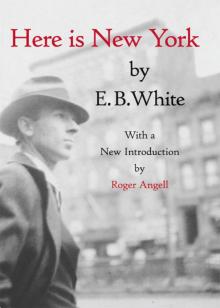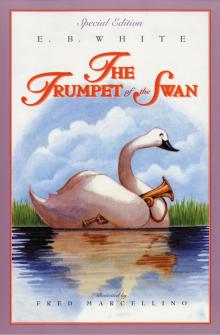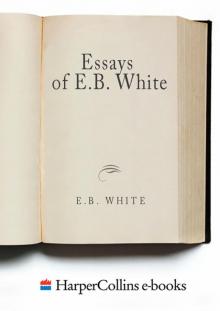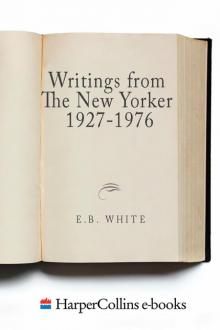- Home
- E. B. White
Letters of E. B. White Page 3
Letters of E. B. White Read online
Page 3
Lillian, also a redhead, was the fifth child. I got on pretty well with Lil and still do (we are not far apart in age). She was a pretty girl and had many beaux. She liked dances and parties and gaiety. Neither Marion nor Clara went to college, but Lil made it to Vassar and graduated, daisy chain and all. Socially, I was a backward boy, and Lil would occasionally take a stab at getting me going with my peers. It never worked. I never went to dances or took girls out. The nearest I came to that, in my high-school days, was skating with a girl I met on an ice pond.
Lil had a hard time deciding whom to marry among her many suitors. She kept putting the matter off and for a while went to work in New York as a secretary and became a commuter. But after a few years of this, she met another commuter—Arthur Illian, a Wall Street broker—and married him, thus becoming Lillian Illian, a dubious triumph in alliteration. She and Arthur had three girls, Carol, Noel, and Sidney. I grew very fond of my brother-in-law, who was, among other things, a railroad buff. He died (appropriately) in Penn Station, in middle life, and Lil has been a widow for many years. She lives in Northport, Long Island, near her three married daughters.
On the summer morning when I arrived in this world, there was a breakdown in communications. Dr. Archibald Campbell was supposed to come to the house and deliver me, but he couldn’t be reached. At the last minute, some member of the family looked out of a front window, saw Dr. Campbell driving by in his buggy, flagged him down, and hustled him up to Mother’s bedroom, where he took over. My numbers were lucky ones: July is the seventh month, and I appeared on the eleventh day. Seven, eleven. I’ve been lucky ever since and have always counted heavily on luck.
When the time came for me to enter kindergarten, I fought my parents with every ounce of my puny strength. I screamed and carried on. The idea of school terrified me—I wanted to stay home and live peacefully in familiar surroundings. My parents, of course, won, after a showdown, and I was bundled off to P.S. 2 on Lincoln Avenue. The name of my kindergarten teacher was Miss Greene. We sat in little chairs in a circle. There was a pudgy girl who thought I was cute and wanted to hold my hand. I hated her with all my heart and would pull my hand away in revulsion.
I spent the next nine years in P.S. 2. I covered the distance on foot or on a bicycle. There were no school buses, and there was no nonsense in the classroom, either. Nothing was called “language arts” or “social studies.” Everything went by its simple name: reading, writing, spelling, arithmetic, grammar, geography, history, music. I was a diligent scholar—more from fear of falling behind than from intellectual curiosity—and got good marks. School opened with an assembly, in a big room where we saluted the flag, listened to the principal read a passage from the Bible, heard one student recite a piece from the platform, and then marched out to piano music by Mrs. Schuyler, with whom I was in love. It was in P.S. 2 that I contracted the fear of platforms that has dogged me all my life and caused me to decline every invitation to speak in public. For the assembly performances, pupils were picked in alphabetical order, and since there were a great many pupils and my name began with W, I spent the entire term dreading the ordeal of making a public appearance. I suffered from a severe anticipatory sickness. Usually the term ended before my name came up, and then the new term started again at the top of the alphabet. I mounted the platform only once in my whole career, but I suffered tortures every day of the school year, thinking about the awesome—if improbable—event.
By 1908, our household was beginning to thin out. Marion and Clara had married and were having children. In the fall, Albert and Stanley went off to college. That left just Father and Mother and Lillian and me, plus the domestics.
For me the golden time of year was summertime, when we all went for one month to a rented camp on the shore of Great Pond, one of the Belgrade Lakes, in Maine. This Belgrade era began, I think, in 1904, when I was five years old. It was sheer enchantment. We Whites were city people—everything about Belgrade was a new experience: the big fresh-water lake, the pines and spruces and birches, the pasture with its sweetfern and juniper, the farmhouse where we took our meals, the rough camp with its sparsely furnished bedrooms, the backhouse with its can of chloride-of-lime, the boating, the swimming, and the company of other campers along the shore. The month of August was four solid weeks of heaven. Father took exactly one month’s vacation, always the month of August. July was a waiting time at 101 Summit Avenue—sultry summer nights in a hammock on the screened porch, games in the street just before dark, the smell of honeysuckle and of the dust laid by the sprinkling cart. Families stayed together in that innocent era—the young were less apt than they are now to go off on their own or to take a summer job. Resort places always had a liberal supply of young bucks in ice-cream pants and young girls in pretty frocks. America’s nomadic life had not begun—the campers and the trailers and the outboard boats and the minicycles lashed to the top.
The journey to Belgrade was by rail and was a miracle of planning and execution. The packing of the trunks began weeks in advance of the target date. Father, who spent thousands of hours commuting between Mount Vernon and New York in a day coach, embraced Pullman travel with a real passion—a once-a-year affair, when he shot his wad and bought overnight accommodations on the Bar Harbor Express for his entire family. It must have run into a lot of money, but Father was no pinchpenny, once he had a dream firmly in mind. The Bar Harbor Express left New York in the evening and got to Belgrade at about nine the next morning. Since it did not stop at Mount Vernon, we all had to pile into New York on a late afternoon train, after a great business about the trunks. Father was everywhere, masterminding everything. Mother looked after the younger children. And when we reached Grand Central, we went in a swarm to Mendel’s restaurant for dinner, and Mr. Mendel himself, who also lived on Summit Avenue, would come to our table to greet us and we would all jump to our feet, including Mother, at the excitement of being recognized and singled out in a great public dining hall by the proprietor himself. Then the boarding of the fashionable train, and the green delights of compartments and drawing rooms and uppers and lowers. The fan had three speeds, with little Elwyn at the controls, happy with anticipation of the morrow and the fatigue of today. Mother always slept in her clothes, to be ready for the derailing.
The delicious smells and sounds of Belgrade are still with me after these many years of separation. I spent much of my time in a canoe, exploring bogs and streams, netting turtles. At night in bed, I fell asleep to the distant thump of a single-cylinder engine far out on the lake—a benign passage on dark waters. The little launch Al and Stan had built in Mount Vernon was shipped to Belgrade, and we would all crowd into her, nestling together in the tiny cockpit like barn swallows in their nest, and cross the pond in all kinds of weather. She was named Jessie, after Mother, who couldn’t swim and who hated and feared the water. Only through the indulgence of Providence did my family survive those crossings, for the Jessie was almost always in a seriously overloaded condition, gamely dragging her ensign in the wake and right on course for disaster. Father would be in his round white flannel hat, Mother shading herself with a parasol, Lillian in ribbons and bows, Albert and Stanley nursing the brave little engine. Leaving the Gleason shore, we would steer straight for Horse Point a mile away, give the Point a berth of only twelve feet to take advantage of the deep water, then veer in a westerly direction for the long two-mile hitch to Allen Point, passing between Wentworth Shoal and the Ledges, then on to the well-concealed mouth of Belgrade Stream, which led to the Mills. At Bean’s store, Father would treat us to a round of Moxie or birch beer, and we could feed the big bass that hung around the wharf and then head back across the lake, sometimes adding to the boat’s already intolerable burden a case of Moxie—Father’s favorite drink. (There was a new drink out called Coca-Cola, but Father assured us it was a cheap imitation of Moxie and without virtue.)
From P.S. 2, I went on to the Mount Vernon High School. I liked Latin pretty well but never was able to get a mod
ern language and am still monolingual. Some of the girls were beginning to wear silk stockings, and this got my thoughts moving. I didn’t care for athletics, being skinny and small, but I liked ice ponds and skating, and on winter afternoons and evenings I would visit a pond (a fifteen-minute ride on a trolley car) and skate with a girl named Mildred Hesse. Her eyes were blue and her ankles were strong. Together we must have covered hundreds of miles, sometimes leaving the pond proper and gliding into the woods on narrow fingers of ice. We didn’t talk much, never embraced, we just skated for the ecstasy of skating—a magical glide. After one of these sessions, I would go home and play Liebestraum on the Autola, bathed in the splendor of perfect love and natural fatigue. This brief interlude on ice, in the days of my youth, had a dreamlike quality, a purity, that has stayed with me all my life; and when nowadays I see a winter sky and feel the wind dropping with the sun and the naked trees against a reddening west, I remember what it was like to be in love before any of love’s complexities or realities or disturbances had entered in, to dilute its splendor and challenge its perfection.
TO ALBERT HUNT WHITE
101 Summit Ave.
Mt. Vernon, New York
Oct. 21, 1908
Dear Albert,
I am sure it is a long time since your post came, but I have been waiting for something to say. I think it will be about eight or nine years before I go to Cornell. Hope so anyway. Yesterday I received a letter from Kezzie.1 She says Elwyn, her little boy, don’t like Sunday school. One day Kezzie asked him why he didn’t and he answered that he s’posed he’d never been brought up that way.
To-day the big Albany day-boat “New York” was into the pier being repaired when it caught on fire and burned up. The paper does not say whether or not anyone was killed. . . . It isn’t a very nice day and I’ve got a cold so I didn’t go to school. Mamma brought me a tennis ball and if I be very careful can I use your racket? I just heard now while I’m writing this letter that Philis Goodwin [a neighbor’s child] died. They wouldn’t have a doctor and so you see. Pa bought me a new book of music. I know eight pieces out of it already. I am also composing pieces too. There isn’t much more to say except we are all well.
Lovingly,
Elwyn
To ALBERT HUNT WHITE
[Mount Vernon, New York]
[1910]
Dear Ally,
Oh! The hill by our house is simply grand for coasting. I got a hitch on a sleigh down to the postoffice and back.
I am taking music lessons of Miss Ihlefeld.
We have certainly enjoyed that book of pieces you gave Lill for Xmas.
I know you’re going to laugh when I tell you I got 98% in Physiology exam.
Tell Bun I thank him awfully much for the use of his skis (which I use every day).
Well I’ll certainly be glad to see you Easter.
Lovingly, En
To ALBERT HUNT WHITE
Chester Hill
Mount Vernon, New York
April 21, ’10
Dear Ally,
Received your letter with much rejoicing. I had to ask ma how to spell rejoicing and I don’t know as I have it right yet. Please excuse me if I didn’t or rather excuse ma.
Well I got over the comet pretty well although Esther and Winnie were scared out of their skin.1
Our garden is coming along pretty durn well
CONSIDERING
The cosmos and sweet peas and nasturtiums and poppies are up and thriving. We just put in more seeds a couple of days ago. We put in enough so that some, at least, will come up. I had to much ink on my pen when I dotted those eyes. As you see and I had to rub them out and put new ones in their place.
This letter is beeing writed—that’s pronounced (rtěd)—before school in the morning so you must excuse my careless writing.
Wallace Hart still keeps on eating night walkers and live flies and cotton and paper and still looks as well as usual.2 I guess he takes to his pa for an appetite. I didn’t have to ask any body how to spell appetite cause it was in my spelling lesson.
Well there haint much more to say so I’ll have to close—anyway I have to scoot to that blessed school.
From
Master Elwyn Brooks White
To STANLEY HART WHITE
[Mount Vernon, New York]
[April 1915]
Friday night
Dear Stan,
There have been several topics of local interest lately arisen which I will try in a few words to enumerate:
I received your letter and the box of ground coverings, but you didn’t say what to do with the extra tree which I mentioned, from the last lot. Please tell me.1
The ground coverings are safe between the two beech trees, and I might add that Matilda’s pastry doesn’t compare with the texture of my mud. I will do my utmost to make them grow.
The place is looking just grand in fresh green leaves. The grand plan is beginning after my years of labor to eventuate. It’s just in time, too, for the house, as you know, is in the market.2 Grass appears by the front piazza, two blossoms burst on the magnolia bush, red tulips and little white flowers line the side walk, and yellow jonquils proclaim the official boundary line. But as Kenneth Walters says, “Rome was not made in a day.”
My camelian thrives and grows tamer day by day, that is, providing I don’t go near him. Also I have other live stock to the amount of one large, grey, ill-tempered hen, and thirteen eggs. They are in the same box, and my hopes are high.
Spinach, parsley, and lettuce are up with the rest of the maple seedlings, violets, and lilies-of-the-valley.
I finished the pen drawing of the camp, and made less of a mess of it than I thought I would, which isn’t saying much. However, I like that kind of stuff because it’s so easy.
Having sold all the junk in the barn to the junkman, and the two front vases to a private party, I am now in funds to the amount of $9.80. Father raved because you busted his $10 vase stones. I vividly narrated (when he asked me) how you got so mad at them that you mercilessly smashed them to pieces with a pick. Indeed, my boy, considering the load of manure, etc, I think that if you break one more pebble on the place, or spend about fifty cents more, you’re going to get in Dutch with the paternal end of the family. Let that suffice.
For the last few days, I have been blamed for every disagreeable thing which has happened in the last few years: me and the hen have. The other morning when I came home from school, Ma would hardly speak to me, because she said I had deliberately locked her and Peter out of the barn when I knew she wanted to clean it. I had merely shut the sliding doors after taking my wheel out, as I have been instructed hundreds of times by Father; and Ma and Peter were mentally and physically incapable of opening them (there’s sort of [a] combination to them as you probably know). I did it one handed when I came from school. I thought it was pretty hard on the hen, seeing as she wasn’t in the barn at all.
Oh well!
They have adopted a plan for fixing up the ground in back of the High School for an athletic field. Five hundred dollars has been appropriated by some guy, and the fellows are to do the work. You volunteer for 3 hours work some afternoon in the week, and are put in a certain squad. The work for the boys consists of running wheelbarrows, spading dirt, and lifting[?] heavy bricks; the girls serve lemonade. It will be some job to grade the place, but with fifty fellows working every afternoon, it can probably be accomplished.
Only seventeen days till Brünhilde comes off the eggs.
Faithfully,
Buttercup
P.S. You said a mouthful when you wrote, “Clear the nursery of old roots and things.”
• In 1916 Stanley was employed as landscape architect by the Lake Placid Club. White was looking for a summer job and wrote to Stanley, sounding him out. He eventually did find work at the club, caddying on the golf course and working as chainman for a surveyor who was mapping the place.
To STANLEY HART WHITE
Chester Hill
Mount Vernon, New York
[May 14, 1916]
Saturday
Dear Stan,
I’m not sure what I’m going to do this summer. If I can get a good job, I’d rather work than anything else. If not I will probably spend my vacation with father. He has suggested several places—Muncie Island, Muskoka Lakes, Canada, Moosehead Lake, and 101 Summit.
My Sunday-school teacher is the pastor’s assistant at the 1st Baptist Church. Last night I was at a class meeting, and found out he had been a bell hop at the Lake Placid Club two or three summers ago, that he also had been head clerk, and that he knows Mr. Dewey1 and all the others very well. His name is Clausen. His brothers have worked there too, and I think are going to be there this summer.
I have an idea that it would be very nice if I could get a job as bell hop there during the busy months in the summertime. It’s light work and pretty good pay, besides which, being rather novel. Don’t you think brass buttons would show me off to good advantage?
Here’s where you can help me. Look around and size up the situation on paper for me. Without saying anything to anybody you can write me and tell me about it. I haven’t mentioned it to anybody here: in fact I only just thought of it about an hour ago. Please let me know soon because the sooner I get in my application the better.
Mr. Clausen lent me the 1914 handbook. I think the simplified spelling is the most complicated affair I ever saw. The place must be pretty good if that hasn’t queered it. I suppose you will soon be writing home to “get ready, the end iz cuming!” Here is a sentence from the handbook: “Juj the distanse and pich the ball az high az you can consistentli with accurasi.”
The place here looks great—some of the bulbs around the well have come up and the east flower borders look fine with their many colored tulips and green stalks. The new grass sprung into existence suddenly and is doing well. Father is greatly pleased with it and said that it was worth all it cost just to make the place look green if only for a couple of weeks. I thought that showed enthusiasm, if not faith. The lilacs and pansies and iris are out, also the floribunda by the well, and in fact everything but the two little aques viteres who always are tardy. Someone asked Mother the other day about the floribunda, and Mother exclaimed with pride: “Why that’s our little apple tree!” The pear tree is full of blossoms and promises good fruit next fall.

 Charlotte's Web
Charlotte's Web Stuart Little
Stuart Little The Elements of Style
The Elements of Style Here Is New York
Here Is New York The Trumpet of the Swan
The Trumpet of the Swan Essays of E. B. White
Essays of E. B. White Writings from the New Yorker 1925-1976
Writings from the New Yorker 1925-1976 Letters of E. B. White
Letters of E. B. White